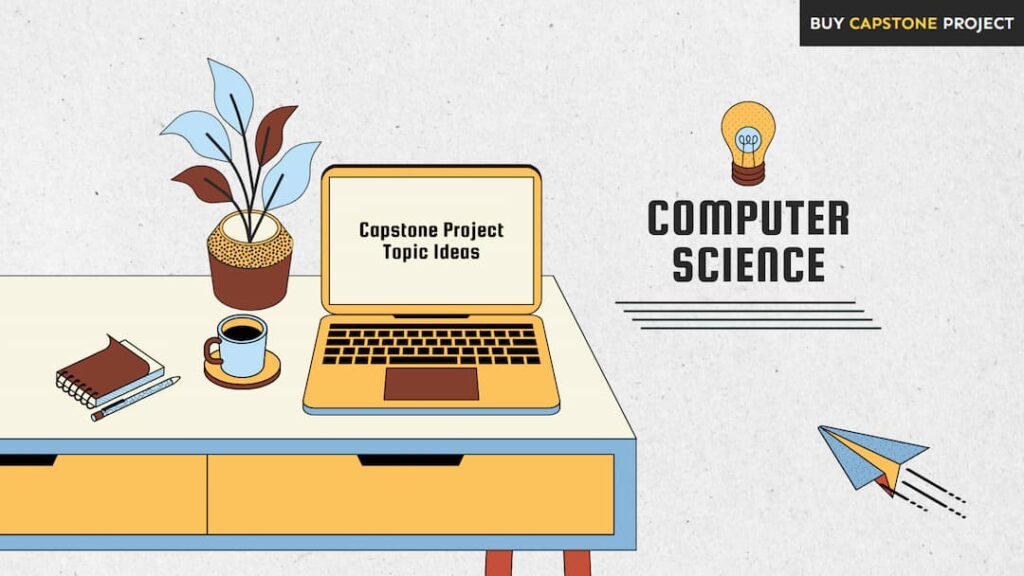The Best Capstone Project Topic Ideas on Computer Science
1. Machine Learning and Data Mining
Research Question 1:
How do supervised learning algorithms compare in terms of prediction accuracy on real-world datasets?
Overview: Students can compare algorithm performance metrics by testing models on publicly available datasets.
Research Question 2:
What methods improve feature selection in high-dimensional data?
Overview: Analyze various feature reduction techniques using statistical tests and validation metrics to determine their effectiveness.
Research Question 3:
How does data imbalance affect classification performance, and what strategies mitigate its impact?
Overview: Evaluate techniques such as oversampling, undersampling, and synthetic data generation on datasets with imbalanced classes.
2. Cybersecurity and Intrusion Detection
Research Question 1:
What machine learning techniques are most effective in identifying network intrusions?
Overview: Compare detection rates and false alarm metrics by implementing different algorithms on network traffic datasets.
Research Question 2:
How do real-time anomaly detection systems perform under varying network loads?
Overview: Develop simulation models and analyze system responsiveness to understand performance under stress.
Research Question 3:
What are the challenges in detecting advanced persistent threats using automated systems?
Overview: Review recent case studies and system logs to pinpoint limitations and propose improvements.
3. Internet of Things (IoT) Systems
Research Question 1:
How can energy-efficient protocols improve the performance of IoT sensor networks?
Overview: Compare various communication protocols by measuring energy consumption and data transmission reliability.
Research Question 2:
What are the security vulnerabilities in current IoT frameworks, and how can they be mitigated?
Overview: Examine documented case studies and perform penetration tests to identify weaknesses and propose countermeasures.
Research Question 3:
How does edge computing integration enhance real-time data processing in IoT systems?
Overview: Evaluate system performance by comparing latency and throughput between edge-based and cloud-based processing models.
4. Cloud Computing and Virtualization
Research Question 1:
How does containerization impact the scalability and performance of cloud applications?
Overview: Analyze performance benchmarks and scalability metrics by deploying containerized applications versus traditional virtual machines.
Research Question 2:
What are the security challenges associated with multi-tenant cloud environments?
Overview: Review security incidents and audit reports to understand risks and propose best practices for isolation.
Research Question 3:
How do serverless architectures compare with traditional cloud services in terms of cost efficiency?
Overview: Conduct cost analysis studies based on resource usage and performance metrics from different deployment models.
5. Blockchain Technologies and Applications
Research Question 1:
What factors affect the scalability of blockchain networks in high-transaction environments?
Overview: Evaluate various consensus mechanisms and network architectures by analyzing throughput and latency measurements.
Research Question 2:
How do smart contracts improve efficiency in decentralized applications?
Overview: Analyze case studies and prototype smart contract implementations to assess benefits in automation and transparency.
Research Question 3:
What are the primary security challenges in blockchain technology, and how can they be addressed?
Overview: Review documented vulnerabilities and analyze proposed solutions to determine their effectiveness in preventing attacks.
Yo, CS fam, if your capstone is bugging you out with endless code and stress, we’ve got the fix with our capstone project online service. Let us handle the heavy code so you can chill and keep your projects running smooth!
6. Natural Language Processing (NLP)
Research Question 1:
How do transformer-based models compare with traditional NLP models in text classification tasks?
Overview: Benchmark model performance using accuracy, precision, and recall metrics on standard datasets.
Research Question 2:
What techniques enhance sentiment analysis accuracy across diverse languages?
Overview: Examine language-specific preprocessing and transfer learning methods to identify strategies for improving sentiment detection.
Research Question 3:
How can named entity recognition be improved in noisy, user-generated content?
Overview: Evaluate model performance on social media or forum data, and test preprocessing approaches to filter out noise.
7. Computer Vision and Image Processing
Research Question 1:
How do convolutional neural networks perform in object detection tasks compared to traditional methods?
Overview: Compare detection accuracy and processing speed using benchmark image datasets and evaluation metrics.
Research Question 2:
What techniques improve image segmentation accuracy in medical imaging?
Overview: Analyze different segmentation models and assess improvements by comparing with expert annotations.
Research Question 3:
How can transfer learning accelerate model development for specialized image recognition tasks?
Overview: Experiment with pre-trained networks and fine-tune them on domain-specific data to evaluate time and performance benefits.
8. Software Engineering and Agile Methodologies
Research Question 1:
How does the implementation of agile practices affect software project delivery time?
Overview: Review project management data and team performance records to compare agile and traditional methodologies.
Research Question 2:
What role do continuous integration and continuous deployment play in enhancing software quality?
Overview: Analyze defect rates and release cycles before and after adopting CI/CD pipelines.
Research Question 3:
How does code review frequency impact the maintainability of software projects?
Overview: Gather metrics on code quality and team collaboration to evaluate the benefits of regular peer reviews.
9. Mobile Application Development
Research Question 1:
How do cross-platform development frameworks compare in terms of performance and user experience?
Overview: Compare performance benchmarks and usability testing results across multiple frameworks.
Research Question 2:
What are the key factors influencing mobile app security in multi-platform environments?
Overview: Review case studies and security assessments to identify common vulnerabilities and mitigation strategies.
Research Question 3:
How can machine learning be integrated into mobile applications to enhance user personalization?
Overview: Develop prototypes that incorporate recommendation systems and measure their impact on user engagement.
10. Distributed Systems and Big Data
Research Question 1:
How do distributed computing frameworks handle scalability challenges with increasing data loads?
Overview: Analyze performance data from frameworks like Hadoop or Spark under various load conditions.
Research Question 2:
What are the trade-offs between consistency and availability in distributed databases?
Overview: Review theoretical models and real-world case studies to understand how systems balance these two factors.
Research Question 3:
How can data partitioning strategies improve processing efficiency in big data applications?
Overview: Compare different partitioning methods using experimental setups to assess their impact on query performance.
11. Human-Computer Interaction (HCI) and User Experience
Research Question 1:
How do interface design elements affect user engagement in mobile applications?
Overview: Conduct usability studies and A/B testing to measure how design variations influence user interaction.
Research Question 2:
What role does accessibility play in improving the overall user experience?
Overview: Evaluate interface designs through user testing with diverse populations to identify key accessibility features.
Research Question 3:
How can user feedback be effectively integrated into the iterative design process?
Overview: Study feedback collection methods and measure their influence on design iterations and final product usability.
12. Data Privacy and Security in Software Systems
Research Question 1:
How effective are current encryption methods in safeguarding user data in cloud applications?
Overview: Evaluate encryption performance and resilience against attacks through simulations and security audits.
Research Question 2:
What are the challenges in implementing privacy-preserving data mining techniques?
Overview: Review literature on data anonymization and test different methods on sample datasets to measure privacy and utility trade-offs.
Research Question 3:
How do regulatory frameworks influence the design of data security protocols in software systems?
Overview: Analyze policy documents and case studies to understand how legal requirements shape security practices.
13. Algorithm Optimization and Complexity
Research Question 1:
What strategies effectively reduce time complexity in sorting algorithms?
Overview: Compare various sorting methods through empirical tests to evaluate their efficiency on large datasets.
Research Question 2:
How can parallel processing be applied to optimize algorithm performance?
Overview: Develop parallel versions of algorithms and measure speedup and resource utilization against serial implementations.
Research Question 3:
What are the benefits and drawbacks of heuristic algorithms in solving NP-hard problems?
Overview: Evaluate solution quality and computational time using benchmark NP-hard problems and heuristic approaches.
14. Virtual Reality (VR) and Augmented Reality (AR)
Research Question 1:
How do VR environments impact learning outcomes in educational applications?
Overview: Conduct controlled experiments comparing traditional learning methods with VR-based instruction.
Research Question 2:
What challenges exist in ensuring low-latency interaction in AR applications?
Overview: Analyze system performance data to identify latency sources and test optimization techniques.
Research Question 3:
How can user feedback be integrated into the design of immersive VR experiences?
Overview: Use usability testing and surveys to gather insights and iterate on interface designs for improved immersion.
15. Quantum Computing Algorithms
Research Question 1:
How do quantum algorithms compare with classical algorithms in solving specific computational problems?
Overview: Benchmark performance differences by simulating quantum and classical solutions on defined tasks.
Research Question 2:
What are the primary challenges in error correction for quantum computing?
Overview: Review current error correction techniques and analyze their effectiveness in maintaining qubit coherence.
Research Question 3:
How can hybrid quantum-classical approaches improve problem-solving in optimization tasks?
Overview: Develop hybrid models and evaluate their performance on standard optimization problems using simulation data.
16. Edge Computing and Real-Time Processing
Research Question 1:
How does edge computing reduce latency in real-time data processing applications?
Overview: Compare system latency between edge and cloud-based processing using time-critical application scenarios.
Research Question 2:
What are the challenges in resource allocation for edge devices under dynamic workloads?
Overview: Analyze workload patterns and develop algorithms to optimize resource distribution across edge networks.
Research Question 3:
How can security measures be implemented effectively in edge computing environments?
Overview: Review existing security protocols and test their performance on edge architectures to identify potential improvements.
17. DevOps and Continuous Integration/Deployment
Research Question 1:
How does the adoption of DevOps practices affect software delivery cycles?
Overview: Analyze project metrics and case studies comparing traditional and DevOps-driven development pipelines.
Research Question 2:
What tools and practices are most effective for implementing continuous integration in large teams?
Overview: Evaluate various CI tools and gather team feedback to determine the best practices that reduce integration errors.
Research Question 3:
How can automated testing improve software reliability in continuous deployment environments?
Overview: Compare failure rates and deployment times before and after the integration of automated testing protocols.
18. Social Media Analytics and Sentiment Analysis
Research Question 1:
How can machine learning models be applied to analyze sentiment trends on social media platforms?
Overview: Implement classification models on social media data and evaluate their accuracy using sentiment-labeled datasets.
Research Question 2:
What factors influence the spread of information and misinformation on social networks?
Overview: Analyze network graphs and engagement metrics to identify key influencers and patterns in content dissemination.
Research Question 3:
How do real-time analytics impact decision-making in digital marketing strategies?
Overview: Examine case studies of marketing campaigns to determine how insights from social media analytics inform strategic adjustments.
19. Bioinformatics and Computational Biology
Research Question 1:
How can algorithmic approaches improve the analysis of genomic data?
Overview: Compare different sequence alignment algorithms by evaluating their speed and accuracy on large genomic datasets.
Research Question 2:
What role do data visualization techniques play in interpreting complex biological data?
Overview: Develop visualization tools and assess their effectiveness in conveying insights from multi-dimensional biological data.
Research Question 3:
How can machine learning enhance the prediction of protein structures?
Overview: Test various predictive models using known protein datasets and evaluate improvements in structural accuracy.
20. Autonomous Systems and Robotics
Research Question 1:
How do sensor fusion techniques improve the navigation accuracy of autonomous robots?
Overview: Compare robot performance by integrating data from multiple sensors and analyzing localization accuracy.
Research Question 2:
What algorithms optimize path planning in dynamic environments?
Overview: Evaluate different path planning approaches through simulations in environments with moving obstacles.
Research Question 3:
How can reinforcement learning be applied to improve decision-making in robotic systems?
Overview: Develop simulation models where robots learn optimal behaviors and assess performance improvements over time.







